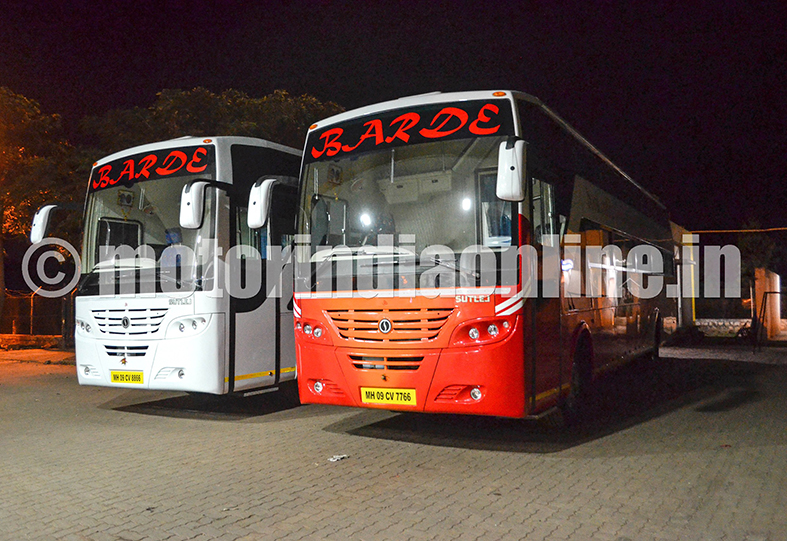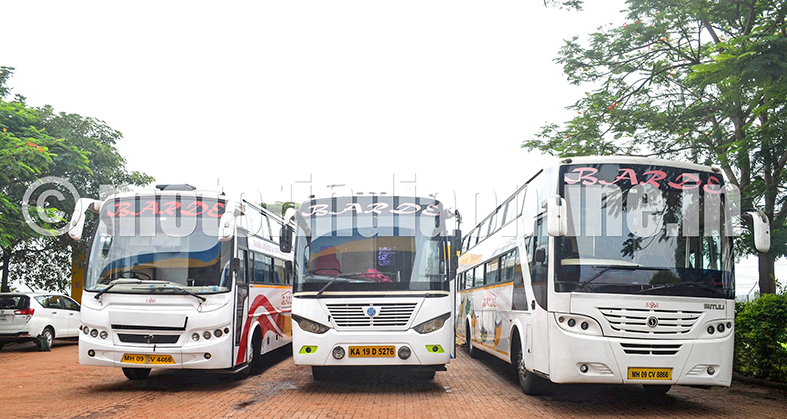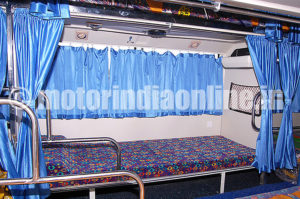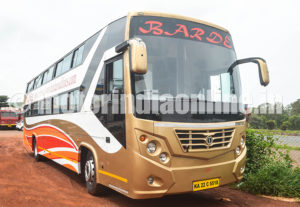Belagavi in North Karnataka has been a hub and birth place of the region’s well-known bus fleet operators, who have dedicatedly served and connected people and places since last two decades. MOTORINDIA approached Barde Travels, one of the dedicated bus fleet operators from the region and spoke to Mr. Vikas Barde and Mr. Avadhut Barde, Managing Director and Director respectively of Barde Travels, in order to get complete details about Barde’s functioning and contribution towards connecting people and places through its sustainable fleet services.
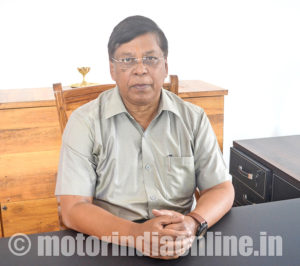
The Barde-Group started its operations with its fraction, Barde Roadlines, in 1972 as a joint venture initiative with Hindalco Industries for materials supply. The company started with truck business and, within two decades, became a pioneer in the field with 44 trucks in operation. In 1996, Barde Travels was formed as a unit of Barde Roadlines focussing on the bus fleet operator business. The company started its operation initially with four Tata buses on the Belagavi-Goa (Panjim) route with day service to the neighbouring State. Soon, Barde expanded its fleet with 10 buses on its new routes connecting Belagavi with Pune, Bengaluru and Mumbai. Sustaining on the operation front, the fleet operator brought Sutlej-built buses and added SMK Prakash coaches to its fleet to expand its operation and passenger services.
Giving an overview of Barde Travels, Mr. Vikash Barde said: “We, at Barde Travels, have been focussing on efforts to provide comfort and luxury-on-wheels to the people of Belagavi. Our bus services value dedication and punctuality as our motto, and, in due course, we had a committed approach towards our motives since inception in 1996. In keeping with the changing technologies, we have brought about some developments on the operation front. We introduced our online booking portal. New luxury AC and non-AC sleeper coaches have been inducted in our fleet keeping in mind the luxury and comfort levels for our passengers. The CCTVs in our coaches take care of passenger-security and their belongings. We have also been taking measures to improve the bus and passenger services on the operation front, and I am happy about the positive feedback from the passengers travelling by our buses”.
Speaking about the bus-maintenance infrastructure, the MD said that the company has its own garage facilities supported with basic maintenance amenities like oil changing equipments and tyre-pressure check-up utilities, for vehicle upkeep. A dedicated team of eight technicians has been kept for mechanical maintenance and care of the bus and truck fleet.
Commenting on the Bus Body Code, he said: “I feel, the mandatory emergency exits as per the Bus Code will prove to be very useful and supportive in emergencies. We have been adhering to our motive of providing the two mandatory emergency exits in our buses – one on the rear-right and the other at the back-end, which will be very effective for passenger evacuation in emergency situations”.
Referring to the major presence of Sutlej-built buses in the fleet, Mr. Avadhut Barde observed: “I feel Sutlej is one of the best bus body builders in the country in terms of the product quality and finishing. The Sutlej coaches added to our fleet have been good on NVH levels and are popular with our customers in terms of luxury and comfort. Six more Sutlej-built buses will be inducted soon”.
Speaking on the future fleet route expansion, the MD cited Mumbai-Goa as one of the strategic routes planned: “We are currently focussing on the sustainability with our existing routes keeping in mind our future route expansion plans. Planning a new route requires a planned strategy to be followed. We study route reports, public reviews, public demand and passenger flow and, above all, the revenue factor. Route survey is also done to ensure the feasibility of travelling”.
Explaining the company approach towards driver and bus crew training, he said the bus crew played an important role and form an integral part of the fleet services. The company relies on experienced drivers for its operations based on good driving skills. It gives instructions to its crew about its concern for women passenger safety, safe driving and better crew behaviour towards passengers. The passenger queries and complaints are being dealt by the MD himself. The staff have also been trained and instructed to keep a follow-up to solve the problems with priority.
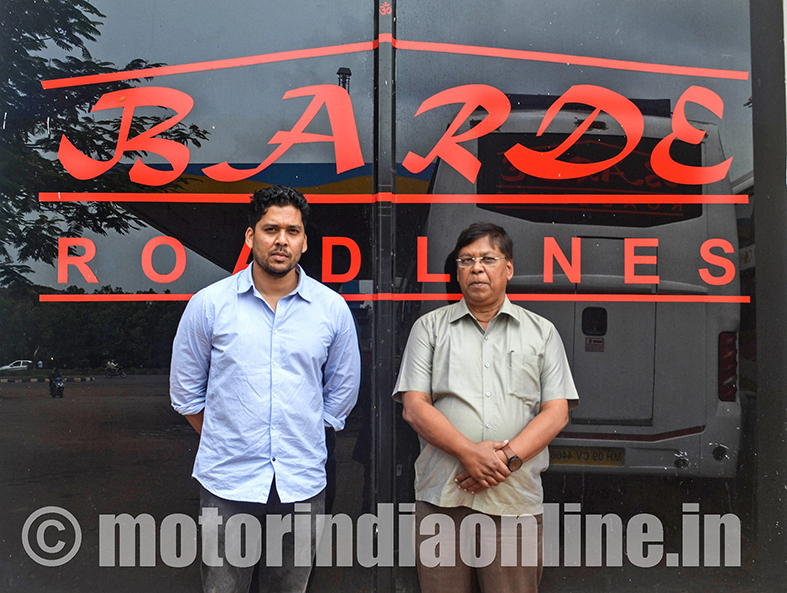
With its fleet operation dedicated to the Pune-Mumbai corridor, Barde runs three services on the Belagavi-Pune and one service on the Belagavi-Mumbai route. Mr. Vikash clarified a point by saying: “We have a good passenger flow on the Pune and Mumbai routes with 85 to 90 per cent occupancy on daily schedules. There is growing demand for seats and berths on the Pune route, especially from passengers from the IT sector and the student community. The passenger flow has been consistently good, thanks to the luxurious coaches in use and the cleanliness of our buses and the punctuality that we maintain with respect to our daily departure and arrival timings. We have regular passengers seeking our services. This promoted our end-to-end fleet operation revenue on the Pune and Mumbai routes.”
The company has added advantages like low average age of the fleet buses, sustainable service, responsible drivers, good bus maintenance and reasonable ticket fares.
Expressing his views on the current scenario of bus fleet operation in Belagavi and North Karnataka, Mr. Avadhut Barde said: “I feel operators in North Karnataka have seen a consistent growth in due course in terms of fleet and route operations. There has been a growth in operator revenue too. But, in the long term, we as a bus fleet operator have encountered challenges like the Government taxation policy and RTO problems. We also face problems related to passenger pick-up within the city due to entry restrictions. I feel there is the need for setting up an association or a council of bus operators in the region for collectively addressing the problems faced by the operators.”
Commenting on the constitution of the Bus Operators Confederation of India (BOCI), Mr. Vikas Barde said: “The birth of BOCI has provided an excellent opportunity to all private bus fleet operators to come to an unified platform for the development of a citizen-friendly, safe, secure and economically sustainable integrated public transport system”.
About the forthcoming Prawaas-2017 to be held in Mumbai, the MD felt that the event would prove an interaction platform for bus operators from both the private and public sector, bus manufacturers, policy makers, NGOs and innovators, which will help explore new opportunities for development of the bus industry in India. He further stressed that the initiation of a B2B dialogue amongst the participants would lead to growing investments in the bus industry.
Sharing his views on GST, the MD felt that the new tax system would initiate the process of a uniform taxation policy pan-India and would bring the much-needed stability in the bus fleet operator business. “I feel GST will prove to be a boon for registered fleet operators in terms of growth in revenue and business development”, he added on an optimistic note.
Explaining the contribution of the bus industry to the tourism sector, Mr. Vikas Barde stressed the need for alignment of road-tax in a proper way so that tour packages can be conducted quite easily.
Summing up on a positive note, the MD observed: “We at the Barde Group and Barde Travels have always been committed to an approach of providing best services to our passengers and people of Belagavi. We have built our business hub at ‘Barde Mangal Karyalaya’, Belagavi, which we term as our epicentre for future business endeavours.”
BARDE TRAVELS STATS :
- Founded in 1996
- Number of buses in fleet : 8
- Longest route operated at present : Belagavi to Mumbai (Borivali) (560 Kms)
- Distance covered everyday : 6,000 kms
- Passengers carried daily : 400
- Schedules per day : 8
- Workforce : 60
